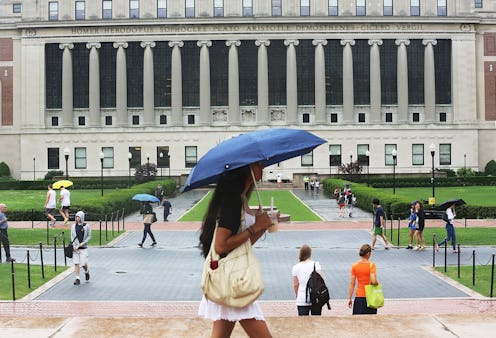News
The NLRB Let Columbia's Grad Students Unionize
Back in undergrad at discussion section, you probably didn't worry about your teaching assistant's economic situation. You were more concerned that they'd call on you the days you hadn't quite finished the reading. But now that you're out in the real world, maybe you should take the teaching assistants' economic role into consideration. The National Labor Relations Board found that grad students at private institutions have the right to unionize, and it's a victory for millennials.
The case centers around grad students at Columbia University in New York City. Members of the graduate student community there complained of late stipend checks and allegedly inadequate medical and dental insurance, so they decided to unionize. But they ran up against a 2004 NLRB decision that said teaching assistants, that time at Brown University, were "primarily students and have a primarily educational, not economic, relationship with their university."
Tuesday's ruling overturned that decision. The board said they disagreed with the 2004 ruling:
The Board has the statutory authority to treat student assistants as statutory employees, where they perform work, at the direction of the university, for which they are compensated. Statutory coverage is permitted by virtue of an employment relationship; it is not foreclosed by the existence of some other, additional relationship that the [National Labor Relations] Act does not reach.
In other words you can be both a student and an employee, but being one doesn't negate the other. NPR reported that tens of thousands of graduate assistants at private universities may choose to unionize now. Some have already been allowed to organize by their administration, and laws covering public universities have made it much easier for students there, including at prominent university systems like the University of California, to organize.
The reason this is so great for millennials is two-fold. One, many teaching assistants are in their twenties or thirties. The average age for obtaining a Ph.D. is 37, and they're working grad students up until that point. No longer will continuing your education have to be done without a say in your working conditions — and these millennial workers will probably get more money too. Already universities have upped stipends in preparation of the ruling (to dissuade unionization drives), but more could come. NYU's contract last year included a 4 percent raise and guaranteed future 2.5 percent.
The other reason this could be big is more symbolic. Young people are looking to unions to solve their financial woes at a time when labor rights have been advancing. The Obama Administration announced it would raise the cap on overtime pay in May, allowing more salaried workers to take home more pay if they're on the job more than eight hours. The Democrats added a $15 per hour minimum wage plank to their party platform in July. But this is not enough and unions can play a bigger role.
Given the state of millennial finances, it's a long time coming to try to find a solution. Government intervention is neither guaranteed nor perfect and unions can fill the gap. Consider this: one of the biggest wealth gaps among Americans is actually between the young and old. One in five millennials lives in poverty, and in comparison to the young of the past, we're much worse off. One of the reasons could be union membership: a Bureau of Labor Statistics report showed that rates of union membership were highest among workers aged 55 to 64.
If momentum grows, the implications of the NLRB decision will be huge for young workers inside and outside academia. Undergrads will be on the front lines of future unionization drives, possibly opening their eyes to it as a solution. Plus, unionization drives may also be easier now than in the past. The NLRB makeup has changed a lot since the 2004 decision that shut down the would-be grad student organizers at Brown. The members are appointed by the president, and now three are Democrats, one is a Republican, and a fifth position remains open.
How exciting if the Columbia decision was just the beginning of a new wave of labor activism and unionization drives. Just consider the words of Kristofferson Culmer, president of the National Association of Graduate and Professional Students. "It has been long established that employees in this country have a right to have a voice in their workplace, and today that right has finally been extended to all graduate-professional student employees," he told Inside Higher Ed. The same could right could be exercised at workplaces across the country.
